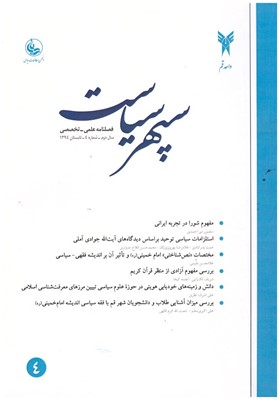استلزامات سیاسی توحید براساس دیدگاه های آیت الله جوادی آملی
محورهای موضوعی : سیاست پژوهی ایرانی (سپهر سیاست سابق)غلامرضا بهروزی لک 1 , همت بدرآبادی 2 , محمدحسن فلاح مداواری 3
1 - دانشیار گروه علوم سیاسی دانشگاه باقرالعلوم قم
2 - دانشجوی دکتری علوم سیاسی دانشگاه باقرالعلوم قم
3 - دانشجوی دکتری دانشگاه یزد
کلید واژه:
چکیده مقاله :
Unity of God is one of the most central belief issues in Islam. This issue in Islam is believed to contribute to the culmination of individuals and the society; so that all the Islamic regulations and the human relations in the social life, such as the cultural and educational relations, commercial and economic contributions, and political and military contracts, are designed based on the principle of the unity of God. Therefore, one of the important issues for the political thinkers has been the way the unity of God influences the politics. To this end, the present article tries to find out what obligations are brought about in the realm of the Islamic politics by the unity of the Divine Essence and the Unity of Divine Acts. The findings reveal that the pluralities within the society and the political system and the position of the power in politics rely upon the Unity of the Divine Essence, which results in a kind of solidarity in the whole system and joins all the components of the ruling system together, and besides a Unitarian view it justifies the pluralism in the political system along its oneness. Furthermore based on the Unity of the Divine Acts, the origin of governance is the authority of God; the prophets, the imams and their deputies are the ones who have the authority of ruling, respectively. Therefore, the legitimacy of the power relies on the Divine permission, and even if it is assumed that the human intellect can come up with a perfect political system, acting in accordance with the necessities of that system somehow requires a manipulation in the power of the Most High God.
_||_

